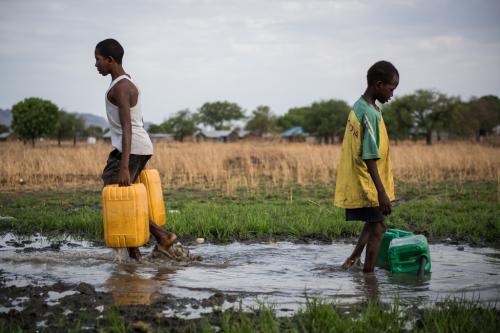Rising cholera, diarrhoea and malnutrition 'deadly' for children in Yemen, South Sudan, Somalia and Sudan, warns UNICEF
Access, funding and security are urgently needed to ensure humanitarians can reach hundreds of thousands of children suffering from cholera and diarrhoea across Yemen, South Sudan, Somalia and Sudan, the United Nations Children's Fund (UNICEF) has said.

Two boys, one 16 years old and the other 12, collect water from a damaged pipe on the outskirts of Juba, South Sudan. The water is pumped from the White Nile River, but is untreated, risking the health of those who consume it.
On top of these diseases, rising rates of malnutrition in these countries “could be deadly for children,” Christophe Boulierac, a spokesperson for the UN agency, said at a regular news briefing in Geneva.
“Access, funding and security are needed in the four countries so that UNICEF and our partners can reach children with an integrated response that deal simultaneously with both malnutrition and disease prevention treatment,” he added.
According to the UNICEF spokesperson, Yemen is presently the worst cholera outbreak in the world with over 260,000 suspected cases and over 1,600 deaths. Of these, half the suspected cases and a quarter of the deaths are among children.
Furthermore, the situation of South Sudan is equally worrying. The current cholera outbreak in the country, which started in June last year, has for the first time lasted through the entire dry season and there are fears that it could worsen as the new rainy season progresses.
About 6,870 suspected cases of cholera have been reported in South Sudan so far this year, informed Mr. Boulierac, noting that children and teenagers accounted for about 51 per cent of the cases.
On top of this, about 1.1 million are malnourished in the country and almost 290,000 children suffer from severe acute malnutrition.
In Somalia, there are about 53,000 cases of cholera (three times more than in 2016 and ten times more than in 2015) and some 1.4 million children are feared to be malnourished, 275,000 of them severely malnourished, the UN spokesperson added.
Furthermore, in Sudan, over 20,000 suspected cases of acute water diarrhoea, with over 400 deaths, had been recorded.
“Over 20 per cent of the affected population are children,” he noted.
Response in midst of daunting challenges
In their response, UN agencies, including UNICEF as well as humanitarian partners have stepped up their efforts but face considerable challenges.
In Yemen, UNICEF delivered a total of 36 tons of life saving medical and water purification supplies to Yemen on board chartered aircrafts. However, with limited access and a national health system ravaged by conflict, there are significant challenges reaching those in need.
Similarly, access is a major obstacle in Sudan where the most affected areas lack safe water and proper sanitation. In the country, UNICEF is also in urgent need of some $22 million to provide life-saving interventions to over 100,000 children.
As part of its programmes, UNICEF along with partners is providing therapeutic and life-saving food treatment to severely malnourished children South Sudan (200,000), Somalia (200,000) and Yemen (320,000). The UN agency is also restoring and equipping health facilities, developing medical and nutritional supply pipelines and providing clean and safe water to vulnerable children and families.
Source:United Nations
- 242 reads
Human Rights
Ringing FOWPAL’s Peace Bell for the World:Nobel Peace Prize Laureates’ Visions and Actions

Protecting the World’s Cultural Diversity for a Sustainable Future

The Peace Bell Resonates at the 27th Eurasian Economic Summit

Declaration of World Day of the Power of Hope Endorsed by People in 158 Nations

Puppet Show I International Friendship Day 2020

